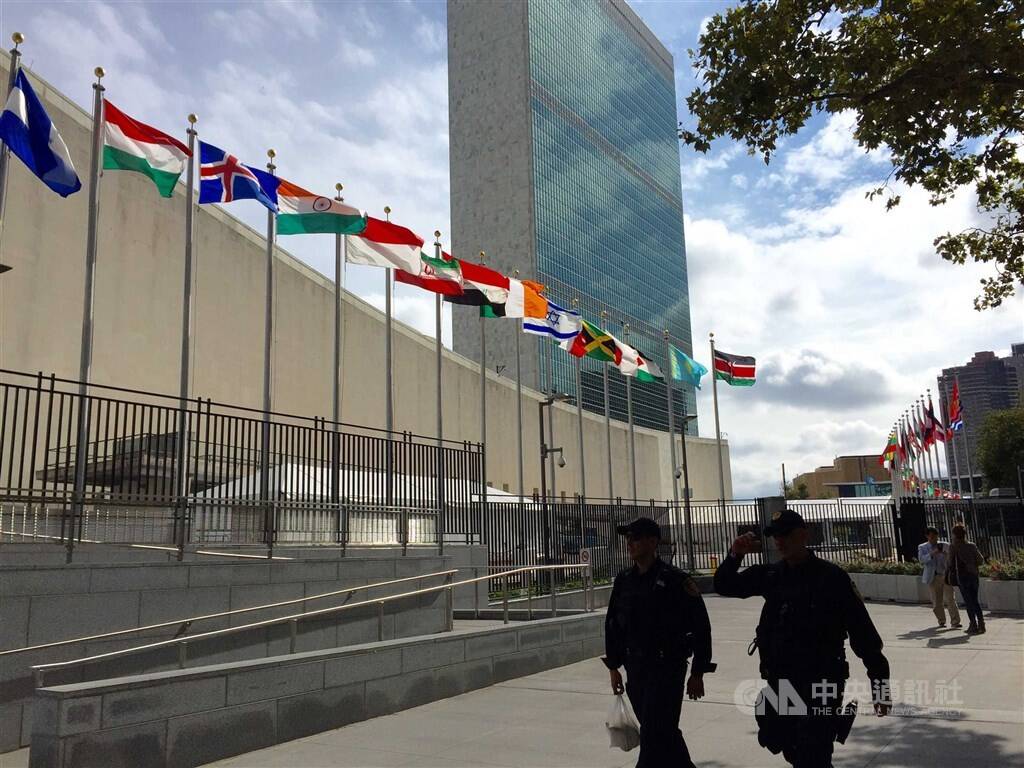A United States representative to the United Nations on Wednesday criticized the People’s Republic of China (PRC) for “misusing” a 1971 U.N. resolution to exclude the Republic of China (ROC, Taiwan) from the international organization, for which Taiwan’s government expressed its gratitude.
The criticism was issued by Ting Wu, deputy political counselor of the United States Mission to the United Nations, during a U.N. Security Council meeting convened by the PRC on Wednesday U.S. time at U.N. headquarters in New York, according to a transcript issued by the mission.
Citing the Concept Note of the round of meeting titled “The Impact of Unilateralism and Bullying Practices on International Relations” which called for opposition to “all forms of unilateralism and bullying,” Wu said the U.S. is critical of China’s “misuse of U.N. General Assembly Resolution 2758,” according to the transcript.

Photo: CNA
Wu spoke of China’s “misuse of U.N. General Assembly Resolution 2758 in its attempts to isolate Taiwan, mischaracterize other countries’ policies, and constrain their choices.”
“This resolution does not preclude Taiwan’s meaningful participation in the U.N. system and other multilateral fora,” Wu said, according to the transcript.
“Working closely with our allies and partners, the United States will continue to counter Beijing’s goals of embedding its authoritarian principles here at the United Nations,” Wu added.
In response to Wu’s comments, Taiwan’s Ministry of Foreign Affairs (MOFA) on Thursday expressed Taipei’s gratitude to Washington over the Taiwan-friendly statement.
This is the first time the U.S. has raised the issue during a U.N. Security Council meeting, MOFA said in a press release.
The last time the Donald Trump administration criticized the PRC’s misuse of the U.N. resolution was in February during the World Health Organization’s 156th session of the Executive Board, MOFA noted.
Resolution 2758 was adopted by the 26th U.N. General Assembly in 1971 to address the issue of China’s representation at the international body.
It resulted in the ROC, Taiwan’s official name, losing its seat at the U.N. to the PRC. Taiwan has since been excluded from participating in the international organization and its affiliates, as it is not recognized by the U.N. and a majority of its member states as a country.

Chinese spouse and influencer Guan Guan’s (關關) residency permit has been revoked for repeatedly posting pro-China videos that threaten national security, the National Immigration Agency confirmed today. Guan Guan has said many controversial statements in her videos posted to Douyin (抖音), including “the red flag will soon be painted all over Taiwan” and “Taiwan is an inseparable part of China,” and expressing hope for expedited reunification. The agency last year received multiple reports alleging that Guan Guan had advocated for armed reunification. After verifying the reports, the agency last month issued a notice requiring her to appear and explain her actions. Guan

GIVE AND TAKE: Blood demand continues to rise each year, while fewer young donors are available due to the nation’s falling birthrate, a doctor said Blood donors can redeem points earned from donations to obtain limited edition Formosan black bear travel mugs, the Kaohsiung Blood Center said yesterday, as it announced a goal of stocking 20,000 units of blood prior to the Lunar New Year. The last month of the lunar year is National Blood Donation Month, when local centers seek to stockpile blood for use during the Lunar New Year holiday. The blood demand in southern Taiwan — including Tainan and Kaohsiung, as well as Chiayi, Pingtung, Penghu and Taitung counties — is about 2,000 units per day, the center said. The donation campaign aims to boost

The Kaohsiung Tourism Bureau audited six hotels in an effort to prevent price gouging ahead of Korean band BTS’ concert tour in the city scheduled for Nov. 19, 21 and 22 this year. The bureau on Friday said that the audits — conducted in response to allegations of unfair pricing posted on social media — found no wrongdoing. These establishments included the local branches of Chateau de Chine, Hotel Nikko, My Humble House, and Grand Hai Lai, it said, adding that the Consumer Protection Commission would have penalized price gougers had the accusations been substantiated. The bureau said the Tourism Development Act

BACK TO WINTER: A strong continental cold air mass would move south on Tuesday next week, bringing colder temperatures to northern and central Taiwan A tropical depression east of the Philippines could soon be upgraded to be the first tropical storm of this year, the Central Weather Administration (CWA) said yesterday, adding that the next cold air mass is forecast to arrive on Monday next week. CWA forecaster Cheng Jie-ren (鄭傑仁) said the first tropical depression of this year is over waters east of the Philippines, about 1,867km southeast of Oluanpi (鵝鑾鼻), and could strengthen into Tropical Storm Nokaen by early today. The system is moving slowly from northwest to north, and is expected to remain east of the Philippines with little chance of affecting Taiwan,